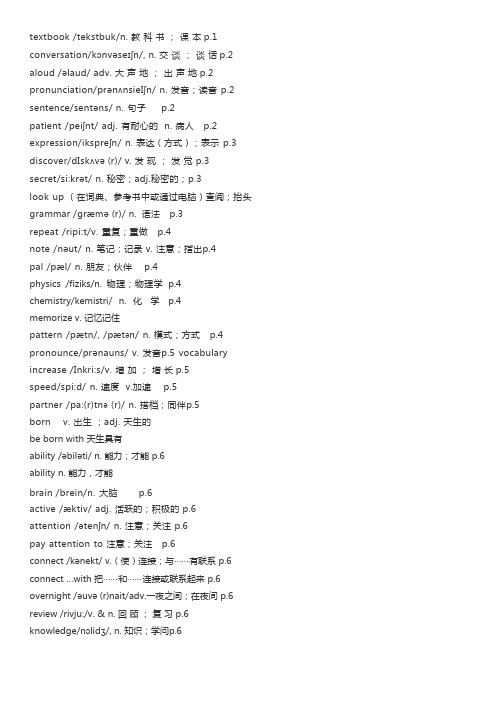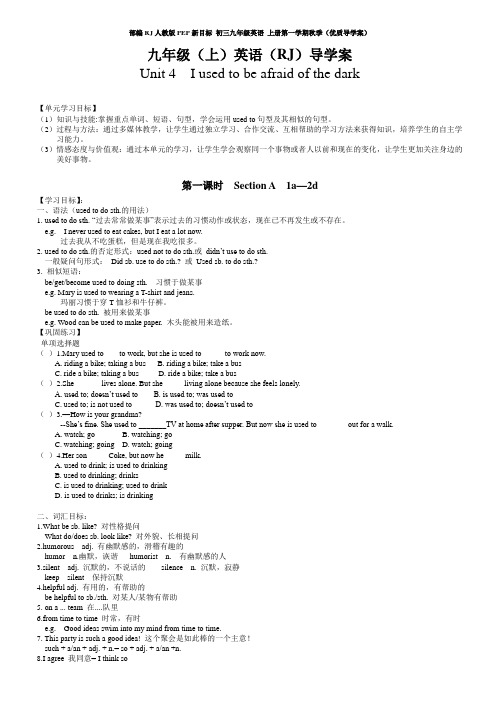新目标英语 九年级(上册)
人教版九年级英语上册unit12新目标(Go for it)版九年级Unit 12 Life i(1

Life is full of the unexpected.
Look at the following pictures and talk about what you usually do in the morning.
I am waken up by the clock.
Then, I stay sleepy for a while.
一、概念 过去完成时表示一个动作或状态在过去某一 时间或动作之前已经完成或结束,也可能是 早已完成或结束,即“过去的过去”;也可
以 指过去的动作延续到过去的某个时刻。 二、结构 “had +动词的过去分词”
三、用法
1. 表示过去某一时间或动作之前已经发生或完 成的动作或存在的状态。句中常用by, before, when, until等词引导时间状语。 它是以过去某一时间为起点,所以过去完成 时是一个相对的时态,表示的是“过去的过 去”。只有和过去某时间或某动作相比较时 才能用到它。
6. Before she got a chance to say goodbye, he h_a_d__g_o_n_e__in_t_o_ the building.
4c Write two true statements and one false statement about your day yesterday. Then ask your classmates to guess the false statement.
② +过去的时间点,主句用过去完成时; 例:By yesterday, the building had been
completed. 截止昨天,这个建筑就已经完成了。 ③ +将来的时间点,主句用将来完成时。 例:By tomorrow, all the students will have been out of the school. 到明天所有的学生 都将离校。
新目标人教版初中英语九年级上册Unit1HowdoyoustudyforatestAB

by finishing my homework seriously.
…
A: How do you study for a test? B: I study by working with a goup. A: How do you learn English ? B: I learn English by asking teachers questions. It
2. ……because he can watch the actors say the words. watch sb. do / doing 我看见他进了一辆出租车。 I watched him get into a taxi. 我看着人们从窗边走过。 I watch people walking past the window.
having
Liu Chang conversations
with friends
studying grammar
joining the English club
1.我认为学英语的最好方法是用英语。 I think the best way to learn English is using English. =I think learning English ____ ______it is the best way. =I think _____English is the best way _____ learn English.
3. 和朋友们练习对话根本没有帮助。 ______conversations with friends wasn't ______ ______ ______.
4. 我们特别兴奋,然后就以讲汉语结束了。 We_______ _____ _____ something and ____ ____ _______ in Chinese.
人教版(新目标)初中英语九年级上册Unit1知识点汇总

textbook /tekstbuk/n. 教科书;课本 p.1 conversation/kɔnvəseɪʃn/, n. 交谈;谈话 p.2 aloud /əlaud/ adv. 大声地;出声地 p.2 pronunciation/prənʌnsieIʃn/ n. 发音;读音p.2 sentence/sentəns/ n. 句子p.2patient /peiʃnt/ adj. 有耐心的n. 病人p.2 expression/ikspreʃn/ n. 表达(方式);表示p.3 discover/dIskʌvə(r)/ v. 发现;发觉 p.3secret/si:krət/ n. 秘密;adj.秘密的;p.3look up (在词典、参考书中或通过电脑)查阅;抬头grammar /græmə(r)/ n. 语法p.3repeat /ripi:t/v. 重复;重做p.4note /nəut/ n. 笔记;记录 v. 注意;指出p.4pal /pæl/ n. 朋友;伙伴p.4physics /fiziks/n. 物理;物理学p.4chemistry/kemistri/ n. 化学p.4memorize v. 记忆记住pattern /pætn/,/pætən/ n. 模式;方式p.4 pronounce/prənauns/ v. 发音p.5 vocabulary increase /Inkri:s/v. 增加;增长 p.5speed/spi:d/ n. 速度 v.加速p.5partner /pa:(r)tnə(r)/ n. 搭档;同伴p.5born v. 出生;adj. 天生的be born with 天生具有ability /əbiləti/ n. 能力;才能 p.6ability n. 能力,才能brain /brein/n. 大脑p.6active /æktiv/ adj. 活跃的;积极的 p.6attention /ətenʃn/ n. 注意;关注 p.6pay attention to 注意;关注p.6connect /kənekt/ v.(使)连接;与⋯⋯有联系 p.6 connect …with 把⋯⋯和⋯⋯连接或联系起来 p.6 overnight /əuvə(r)nait/adv.一夜之间;在夜间 p.6 review /rivju:/v. & n. 回顾;复习 p.6 knowledge/nɔlidʒ/, n. 知识;学问p.6leftlong adj. 终生的;毕生的wisely /waizli/adv. 明智地;聪明地 p.6Annie /æni/安妮(女名)p.2Alexander GrahamBell 格雷厄姆•贝尔 p.602U n i t 1 知识梳理Unit 1 How can we become good learners?【重点短语】1.good learners 优秀的学习者2.work with friends 和朋友一起学习3. study for a test 备考4.have conversations with 与……交谈5.speaking skills 口语技巧6.a little 有点儿7.a t first 起初起先8.t he secret to ............ 的秘诀9.b ecause of 因为10.as well 也11.look up 查阅;抬头看12.so that 以便,为了13.the meaning of ……的意思14.make mistakes 犯错误15.talk to 交谈16.depend on 依靠依赖17.in common 共有的18.pay attention to 注意关注19.connect …with …把……联系20.forexample 例如21.think about 考虑22.even if 即使尽管纵容23.look for 寻找24.worry about 担心担忧25.make word cards 制作单词卡片26.ask the teacher for help 向老师求助27.read aloud 大声读28.spoken English 英语口语29.give a report 作报告30.word by word 一字一字地31.so……that 如此……以至于32.fallin love with 爱上33.something interesting 有趣的事情34.take notes 记笔记35.how often 多久一次36.a lot of 许多37.the ability to do sth. 做某事的能力38.learning habits 学习习惯39.be interested in 对……感兴趣40.get bored 感到无聊【重点句型】1.提建议的句子:①What/ how about +doing sth.? 做…怎么样?如:What/ How about going shopping?②Why don't you + do sth.? 你为什么不做…?如:Why don't you go shopping?③Why not + do sth. ? 为什么不做…?如:Why not go shopping?④Let's + do sth. 让我们做…吧。
新目标英语九年级上册Unit1分析

how 对行为方式提问 how many how much how often how soon how long how far how old how 用于感叹句 How + adj. / adv. + 主语 + 谓语
practice v. 练习,实践 practice doing sth. -What do you usually do at weekends ? -I often practice _____ (speak ) English . n. 实践,练习,锻炼 (不可数名词)
watch sb. do sth. 看到某人做某事
一些使役动词和感官动词用动词不定式(to do)做宾 语补足语时,省略to
一感(feel) 二听 (hear, listen to ) 三让( let, make
have) 四看( look at , see , watch , notice )
find v. 发现 find +宾语(名词,代词,动名词)+ 宾语补足语 (adj. ) = find it (形式宾语)+adj. + 动词不定式 ( to do ) 他发现看课本很无聊。 He finds reading textbooks boring. He finds it boring to read textbooks. I find ____ interesting to play computer games. A. this B. that C. It D. one 我发现做出这道题佷难。 I found _______ ______ the problem ______.
advice 不可数 a picec of advice
部编RJ人教版PEP新目标 初三九年级英语 上册第一学期秋季(优质导学案)Unit 4 导学案

九年级(上)英语(RJ)导学案Unit 4 I used to be afraid of the dark【单元学习目标】(1)知识与技能:掌握重点单词、短语、句型,学会运用used to句型及其相似的句型。
(2)过程与方法:通过多媒体教学,让学生通过独立学习、合作交流、互相帮助的学习方法来获得知识,培养学生的自主学习能力。
(3)情感态度与价值观:通过本单元的学习,让学生学会观察同一个事物或者人以前和现在的变化,让学生更加关注身边的美好事物。
第一课时Section A 1a—2d【学习目标】:一、语法(used to do sth.的用法)1. used to do sth. “过去常常做某事”表示过去的习惯动作或状态,现在已不再发生或不存在。
e.g. I never used to eat cakes, but I eat a lot now.过去我从不吃蛋糕,但是现在我吃很多。
2. used to do sth.的否定形式:used not to do sth.或didn’t use to do sth.一般疑问句形式:Did sb. use to do sth.? 或Used sb. to do sth.?3. 相似短语:be/get/become used to doing sth. 习惯于做某事e.g. Mary is used to wearing a T-shirt and jeans.玛丽习惯于穿T恤衫和牛仔裤。
be used to do sth. 被用来做某事e.g. Wood can be used to make paper. 木头能被用来造纸。
【巩固练习】单项选择题()1.Mary used to ___ to work, but she is used to _____ to work now.A. riding a bike; taking a busB. riding a bike; take a busC. ride a bike; taking a busD. ride a bike; take a bus()2.She ______ lives alone. But she_____ living alone because she feels lonely.A. used to; doesn’t used toB. is used to; was used toC. used to; is not used toD. was used to; doesn’t used to()3.—How is your grandma?--She’s fine. She used to _______TV at home after supper. But now she is used to _______ out for a walk.A. watch; goB. watching; goC. watching; goingD. watch; going()4.Her son _____Coke, but now he _____milk.A. used to drink; is used to drinkingB. used to drinking; drinksC. is used to drinking; used to drinkD. is used to drinks; is drinking二、词汇目标:1.What be sb. like? 对性格提问What do/does sb. look like? 对外貌、长相提问2.humorous adj. 有幽默感的,滑稽有趣的humor n.幽默,诙谐humorist n. 有幽默感的人3.silent adj. 沉默的,不说话的silence n. 沉默,寂静keep silent 保持沉默4.helpful adj. 有用的,有帮助的be helpful to sb./sth. 对某人/某物有帮助5. on a ... team 在....队里6.from time to time 时常,有时e.g. Good ideas swim into my mind from time to time.7. This party is such a good idea! 这个聚会是如此棒的一个主意!such + a/an + adj. + n.= so + adj. + a/an +n.8.I agree 我同意= I think so表示不同意时用I don’t agree 或I disagree9.It’s been three years since we last saw our primary school classmates.自从我们上次小学同学见面以来已经有三年的时间了。
人教版(新目标)初中英语九年级上册Unit4知识点汇总

humorous[ˈhjuːmərəs]有幽默感的;滑稽有趣的silent[ˈsaɪlənt]不说话的;沉默的helpful['helpfəl]有用的;有帮助的from time to time[frɒm//taɪm//tuː//taɪm]时常;有时score[skɔː]得分;打分background[ˈbækɡraʊnd]背景interview[ˈɪntəvjuː]采访;面试 n. Asian[ˈeɪʃ(ə)nˌˈeɪʒ(ə)n]亚洲的;亚洲人的,亚洲人deal with对付;应付dare[deə]敢于;胆敢private[ˈpraɪvɪt]私人的;私密的guard[ɡɑːd]警卫;看守v.守卫;保卫require[rɪˈkwaɪə]需要;要求European[jʊərəˈpiːən]欧洲的;欧洲人的British['brɪtɪʃ]英国的;英国人的speech[spiːtʃ]讲话;发言ant[ænt]蚂蚁insect[ˈɪnsekt]昆虫influence[ˈɪnflʊəns]影响seldom[ˈseldəm]不常;很少proud[praʊd]自豪的;骄傲的be proud of为⋯⋯骄傲;感到自豪absent[ˈæbsənt]缺席;不在fail[feɪl]失败;未能(做到)examination[ɪgˌzæmɪ'neɪʃən]考试;审查boarding school寄宿学校in person亲身;亲自exactly[ɪg'zæktli]确切地;精确地pride[praɪd]自豪;骄傲take pride in为⋯⋯感到自豪grandson[ˈɡrændsʌn]孙子;外孙general[ˈdʒenər(ə)l]普遍的;常规的;总的将军introduction[ɪntrəˈdʌkʃ(ə)n]介绍Paula 葆拉(女名)Alfred 艾尔弗雷德(男名)Billy 比利(男名)Candy 坎迪(女名)Jerry 杰里(男名);杰丽(女名)Emily 埃米莉(女名)02 U n i t 4 知识梳理Unit4 I used to be afraid of the dark.【重点短语】ed to do 过去常常做2.deal with 对付应付3.be proud of 为……骄傲,感到自豪4.take pride in 为……感到自豪5.fromtime to time 时常,有时6.i n public 公开地7.i n person 亲身,亲自8.t ake up sth 开始做,接受,占用9.not……anymore不再10.worry about 为……担忧11.hang out 闲逛12.thinkabout 考虑13.be alone 独处14.on the soccer team 在足球队15.no longer 不再16.make a decision 做决定17.to one’s surprise 令某人吃惊的是18.even though 尽管19.pay attention to 对……注意,留心20.in the last few years 在过去的几年里21.be afraid of 害怕22.turn red 变红23.tons of attention 很多关注24.be careful 当心25.give up 放弃26.a very small number of …极少数的……27.give a speech 作演讲28.all the time 一直总是29.be interested in 对……感兴趣30.change one’s life 改变某人的生活31.take care of 照顾32.one of…, ……之一【重点句型】1. I used to be afraid of the dark. 我过去常常前害怕黑暗.2.I go to sleep with my bedroom light on. 我开着卧室的灯睡觉.3.I used to spend a lot of time playing games with my friends. 以前我常常花很多时间和我的朋友们玩游戏.4.I hardly ever have time for concerts.我几乎没有时间去听音乐会.5.My life has changed a lot in the last few years.我的生活在过去几年里改变了很多.6.It will make you stressed out.那会使你紧张的.7.It seems that Yu Mei has changed a lot.玉梅似乎变化很大.03词汇精讲1.silentsilent是形容词,意为“沉默的;无言的”,其名词形式为silence。
人教版(新目标)初中英语九年级上册 Unit 4
01Unit4 单词humorous[ˈhjuːmərəs]有幽默感的;滑稽有趣的silent[ˈsaɪlənt]不说话的;沉默的helpful['helpfəl]有用的;有帮助的from time to time[frɒm//taɪm//tuː//taɪm]时常;有时score[skɔː]得分;打分background[ˈbækɡraʊnd]背景interview[ˈɪntəvjuː]采访;面试n.Asian[ˈeɪʃ(ə)nˌˈeɪʒ(ə)n]亚洲的;亚洲人的,亚洲人deal with对付;应付dare[deə]敢于;胆敢private[ˈpraɪvɪt]私人的;私密的guard[ɡɑːd]警卫;看守v.守卫;保卫require[rɪˈkwaɪə]需要;要求European[jʊərəˈpiːən]欧洲的;欧洲人的British['brɪtɪʃ]英国的;英国人的speech[spiːtʃ]讲话;发言ant[ænt]蚂蚁insect[ˈɪnsekt]昆虫influence[ˈɪnflʊəns]影响seldom[ˈseldəm]不常;很少proud[praʊd]自豪的;骄傲的be proud of为⋯⋯骄傲;感到自豪absent[ˈæbsənt]缺席;不在fail[feɪl]失败;未能(做到)examination[ɪgˌzæmɪ'neɪʃən]考试;审查boarding school寄宿学校in person亲身;亲自exactly[ɪg'zæktli]确切地;精确地pride[praɪd]自豪;骄傲take pride in为⋯⋯感到自豪grandson[ˈɡrændsʌn]孙子;外孙general[ˈdʒenər(ə)l]普遍的;常规的;总的将军introduction[ɪntrəˈdʌkʃ(ə)n]介绍Paula 葆拉(女名)Alfred 艾尔弗雷德(男名)Billy 比利(男名)Candy 坎迪(女名)Jerry 杰里(男名);杰丽(女名)Emily 埃米莉(女名)02Unit4 知识梳理Unit4 I used to be afraid of the dark.【重点短语】ed to do 过去常常做2.deal with 对付应付3.be proud of 为……骄傲,感到自豪4.take pride in 为……感到自豪5.from time to time 时常,有时6.in public 公开地7.in person 亲身,亲自8.take up sth 开始做,接受,占用9.not……anymore 不再10.worry about 为……担忧11.hang out 闲逛12.think about 考虑13.be alone 独处14.on the soccer team 在足球队15.no longer 不再16.make a decision 做决定17.to one’s surprise 令某人吃惊的是18.even though 尽管19.pay attention to 对……注意,留心20.in the last few years 在过去的几年里21.be afraid of 害怕22.turn red 变红23.tons of attention 很多关注24.be careful 当心25.give up 放弃26.a very small number of …极少数的……27.give a speech 作演讲28.all the time 一直总是29.be interested in 对……感兴趣30.change one’s life 改变某人的生活31.take care of 照顾32.one of…, ……之一【重点句型】1. I used to be afraid of the dark.我过去常常前害怕黑暗.2.I go to sleep with my bedroom light on.我开着卧室的灯睡觉.3. I used to spend a lot of time playing games with my friends.以前我常常花很多时间和我的朋友们玩游戏.4. I hardly ever have time for concerts.我几乎没有时间去听音乐会.5. My life has changed a lot in the last few years.我的生活在过去几年里改变了很多.6. It will make you stressed out.那会使你紧张的.7. It seems that Yu Mei has changed a lot.玉梅似乎变化很大.03词汇精讲1. silentsilent是形容词,意为“沉默的;无言的”,其名词形式为silence。
人教版九年级英语上册unit10新目标(Go for it)版 九年级Unit 10 You’r
b. shake hands
4. _b__ Mexico
c. kiss
5. _a__ Korea
ቤተ መጻሕፍቲ ባይዱ
1b Listen and check the answer in 1a.
1c Make conversations about what people in different countries do when they meet for the first time. Talk about the countries in 1a or other countries.
(make a salute)
You are supposed to make a salute when you meet them for the first time.
What are you supposed to do when you meet them for the first time?
A: What are you supposed to do when you meet him from China for the first time?
B: You are supposed to shake hands when you meet him for the first time.
1a What do people do when they meet for
the first time? Match the countries with
the customs.
1. __c_ Brazil
2. _b__ the United States a. bow
3. _a__ Japan
Maria’s story
初中英语人教新目标九年级Unit1知识巩固练习(附参考答案)
九年级英语上册Unit1巩固练习班级考号姓名总分一、单项选择题1.She improves her spoken English _______ practicing conversations.A.inB.onC.byD.at2.— Mum, my little sister is crying all the time.— Mary, be ______! She feels sick.You should take good care of her.A.patientzyC.politeD.fair3.— ___________ listening to English tapes?—That sounds great.I think it’s a good way to improve your listening skills.A.Would you likeB.Why notC.Could you pleaseD.What about4.Remember this, John.______ careful you are, ______ mistakes you will make.A.The more; the lessB.The more; the fewerC.The less; the fewerD.The more; the more5. — Julie, your mobile is ringing.—Wait a minute.It’s dangerous _______ it while crossing the street.A. answerB.to answerC.answeringD.answered6.— Tommy, you can never let others know what I have told you today.—Don’t worry.I will keep the ______.A.secretB.moneyC.addressD.grade7.—What's the meaning of “ One Belt and One Road”?— Let me ______ the words in the new dictionary.A.look atB.look forC.look upD.look after8.Huangguoshu Waterfall is _______beautiful that I want to come here again next year.C.tooD.enough9.— How do you practice your spoken English?— By ____ English with my classmates.A.speakingB.speakC.spokeD.to speak10.Will you ______ what you said just now? I didn’t catch you.A.speakB.repeatC.describeD.introduce11.In recent years the economy of our country _____ rapidly.A.is increasedB.has increasedC.increasedD.has been increased12.There are so many kinds of MP3 in the shop. We can’t decide _______.A.what to buyB.to buy whatC.which to buyD.to buy which13.His trouble is that he always makes mistakes _____ spelling English words.A.onB.withC.inD.by14.— Why did your father get a ticket(罚单)?— Because he drove _______ a speed of 80 kilometers an hour in the street.A. inB.withC.forD.at15.I’m sorry to tell you that I have no partner ________.A.to practice EnglishB.to practice English withC.to practice English inD.practicing English with16.You need to pay attention to ________ as much as possible.A.speakingB.speaksC.speakD.spoken17.You need to pay attention to ________ as much as possible.A.inD.with18.A good student connects what he reads _____ what he sees around him.A.forB.withC.inD.on19.Remember ________ the book to the library when you finish _______ it.A.to return; to readB.returning; readingC.to return; readingD.returning; to read20.If you can’t finish the work ________, just call me.A.on his ownB.by your ownC.by his ownD.on your own二、根据句意,用括号里所给单词的适当形式填空。
2024-2025学年新目标九年级上册英语Unit2基础知识练习题及答案
2024-2025学年新目标九年级上册英语Unit2基础知识练习题及答案一.根据句意及首字母提示填写单词。
(10分)1. There are many f________ stories in the book. They are quite moving.2. We can see a lot of flowers in the g________.3. Mary is an excellent girl. We a________ her very much.4. I think eating too much d________ is not good for your health.5. There is nothing in the room. You may l________ the bookcase in it.6. His father used to be good at ________(商业).7. This kind of flu can ________(传播)easily in cold weather.8. On my fifteenth birthday I got many different kinds of p________.9. How will your teacher p________ you if you are late for class?10. The policeman has w________ the young man about his careless driving.二、仔细阅读下面五个句子,然后用下面方框中所给的单词或短语填空,使每个句子在结构、句义和逻辑上正确。
(提示:选项中有一个是多余的。
)(5分)1. Tom was very nervous when he spoke to .2. Look! The farmer is his cow to a big tree.3. It's a secret between you and me. Don't it .4. Do you have any or friends in this city?5. It is my turn to you today.三、用所给单词的适当形式填空(10分)1. Mr. Miller often warns his children not ______(swim) in the lake alone.2.The ______(die) of Tom's pet made him rather sad.3.I can feel the ______(warm) of the house in such cold winter. Thank you.st night my brother decided ______(join) the swimming club.5.Have you ever read the latest novel ______(write) by Liu Cixin?四、根据汉语提示完成句子。
- 1、下载文档前请自行甄别文档内容的完整性,平台不提供额外的编辑、内容补充、找答案等附加服务。
- 2、"仅部分预览"的文档,不可在线预览部分如存在完整性等问题,可反馈申请退款(可完整预览的文档不适用该条件!)。
- 3、如文档侵犯您的权益,请联系客服反馈,我们会尽快为您处理(人工客服工作时间:9:00-18:30)。
Unit 10 You are supposed to shake hands.The First Period(Section A 1a—2d)Teaching AimsKnowledge Objects1. Master the key words: custom, bow, kiss, greet2. Master the sentences:In your country, what are you supposed to do when you meet someone for the first time?You’re supposed to shake hands.3. Learn some customs in other countries, and then show opinions about these customs.4. Improve students’ listening and communicative skills.Moral ObjectsOne should know some customs in other countries when meeting foreigners. Processes and Methods1. Learn the new words through word cards and conversations.2. Learn the target language by listening and speaking practice.3. Autonomous and cooperative approach.Teaching Key Points1. Master the key words and target language.2. Be able to talk about different customs.3. Improve students’ listening and speaking skills.Teaching Difficult PointsHow to make greetings when you meet someone for the first time.Teaching AidsA tape recorder, a project, some pictures and handouts.Teaching ProceduresStep 1 Warm-up1. Write the two columns heading on the blackboard: Right and Wrong.T: Please tell me things that are good to do in school and that are not good to do in school.Write each suggestion under the appropriate heading on the blackboard.T: Is it a good idea to come to class late?S1: No.T: That’s right. It’s not a good idea to come to class late. You are not supposed to come to class late.Ss: You’re not supposed to come to class late.T: (Write “come to school late” under wrong.) What are some things you shouldn’t do?S2: We shouldn’t eat in class.T: Right. You’re not supposed to eat in class.2. Ask students to tell about some things that are good to do in school.You should do your homework every day; You should raise your hand before you talk.Rephrase each of these sentences using supposed to and ask students to repeat: You’re supposed to do your homework every day. You’re supposed to do your homework every day. You’re supposed to raise your hand before you talk.Step 2 Presentation1. Teach activities 1a & 1b.These two activities are designed to introduce the new vocabulary and target language by listening and reading.Let students have a look at the instructions and the two lists of words. Read each word and explain them.Show a map of the world, ask students to point out the location of those countries in 1a.Point to the sample conversations in the pictures, ask a pair of students to demonstrate it.Ask students to match the customs with the countries. And then play the tape, check the answers.2. Teach activity 1c.This part is designed to train students’speaking and listening skills by making conversations using the information in 1a and 1b.Read the instruction together with the class and point out the sample conversation. Ask a pair of students to read it.Tell students to talk about the customs in those countries in 1a, and make their own conversations using the information in 1a.Step 3 Practice1. Teach activities 2a & 2b.These two parts are designed to train students’ listening and reading skills.Read the instructions and point to the picture. Ask students to describe what happens.Ask different students to read the mistakes in the chart to the class.Play the tape twice. Get students to finish off the task in 2a.Students read the four sentences in the chart, and listen to the tape again. Finish off the task in 2b according to the words they hear.2. Teach activity 2c.This part is designed to train students’speaking and listening skills by speaking practice.Read the instruction together with the class and point to the sample conversation inthe chart. Ask a pair of students to read it.Ask students to work in pairs to make new conversations using the information in 2a and 2b.As students are working, move around the classroom checking the progress and offering help as needed.After all students finish this activity, ask one or two pairs of students to act out their conversations to the class.Step 4 ConsolidationTeach activity 2d.This activity aims to help students consolidate the target language through a conversation and teach them how to express preferences.First, ask students to read the conversation silently to get the main idea.Then lead students to read it sentence by sentence, explain some language points at the same time.After that, ask students to practice role-playing the conversation in pairs.Give them enough time to do it. Encourage them to make new conversations to talk about their favorite music or movies.Finally invite several pairs to perform for the whole class.Step 5 SummaryIn this class, we’ve learned the new vocabulary about greeting and the structure “be supposed to do”. We’ve also learned the target language by listening and oral practice. Students took active part in class activities and good teaching efficiency was obtained. Step 6 Homework1. Practice reading the conversation in activity 2d.2. Finish the exercises in the workbook.3. Preview the next period.Exercise根据句意及首字母或汉语提示完成句子。
